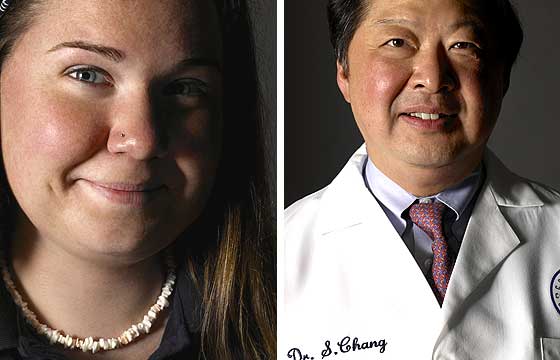
Patient: Kerry O’Connor, 22, student
Doctor: Stanley Chang, ophthalmologist, New York-Presbyterian Hospital, Columbia University Medical Center
O’Connor: I was a senior at Bryn Mawr—stressed about finishing my thesis, worried about getting a job. Two months after my 21st birthday, I had been diagnosed with diabetic retinopathy in both eyes. I’ve had type 1 diabetes since I was 4, and it was causing blood vessels to grow on my retina and scar tissue to form. My eye doctor sent me to a retina specialist, who performed laser surgery to slow down the disease. We thought it had worked, but later that year, my eyesight changed so dramatically I couldn’t even see the big letter E on the top of the eye chart. I kept tripping and falling down, and I had to walk with a blind stick. I couldn’t read, which was depressing, and I ended up dictating my 67-page thesis to my mom. On the day after graduation, I had my first appointment with Dr. Chang.

1. Conductor, 89, With Heart Problems, Too Old and Sick for Surgery2. Firefighter Separates Spine From Skull3. Taxi Driver Survives Testicular Cancer4. Baby With Severe Back and Rib Problems5. College Student Going Blind in Both Eyes6. Factory Worker Loses Hands7. Hockey-Mad 5-Year-Old Has Potentially Fatal Tumor8. Woman Carrying Triplets Has Torn Aorta9. Woman Needs Heart and Lung Transplant10. Hip-Replacement Complications May Cost a Woman Her Leg11. Four Siblings With Potentially Fatal Kidney Disease

Chang: Retinopathy can cause total blindness. Kerry’s disease had progressed so actively in both eyes that we were going to have to operate right away if we were going to save her vision. The blood vessels and scar tissue on her left retina had already caused it to detach, and the eye was filling with blood. Her right retina was partially detached. Diabetic retinopathy isn’t curable, but if you can remove the blood surgically, you can get improvement in the vision.
O’Connor: I didn’t even know that my retina had detached, because it didn’t hurt or anything. I met with Dr. Chang on a Monday and had surgery a week later. At that point I was basically blind, so whatever he needed to do, I wanted him to try.
Chang: With this type of surgery, there’s a 10 percent to 20 percent chance that it’s not going to work. If the scar tissue’s too thick or the blood vessels bleed too much, then the vision’s not going to be regained.
O’Connor: I didn’t like to admit it at the time, but I was really scared that I was going to be blind forever. I wondered about what my life would be like—would I be able to have a job? Would I be able to have a family? Every morning when I woke up, I thought, Is this the last time I’ll be able to see the sun? And my brother had just gotten engaged, and I wanted to be able to see his wedding.
Chang: First we operated on the left eye, which was the worse of the two. We used micro-instruments to go into the vitreous cavity, the middle of the eye, to remove blood and dissect the scar tissue. In Kerry’s left eye, it seemed likely that her vision wouldn’t fully return. The retina had been detached for too long. The surgery on Kerry’s right eye went well. We were able to reattach the retina and remove all the blood and scar tissue. Still, since blood forms in the eye from the cutting during the surgery, there was a period of recovery time afterward during which Kerry had no vision.
O’Connor: I lived with my parents that summer. I couldn’t see, so I listened to a lot of books on tape and TV. About eight weeks after the surgery, the vision in my right eye started coming back. After fourteen weeks I could read, which was something I hadn’t been able to do in a long time. Now I have some peripheral vision in my left eye, and my right eye is doing wonderfully.
Chang: There was a lot hinging on this surgery. It determined whether Kerry would be an independent person or have to be taken care of for the rest of her life.
O’Connor: I can’t even imagine what my life would be like if I were blind. I’m in nursing school at Case Western Reserve and doing well here—I can read and function like everyone else. I can even play tennis. I still sometimes bump into walls and fall down stairs, but that doesn’t have anything to do with my vision. I’m just always racing around trying to get all my work done. Next: Factory Worker Loses Both Hands